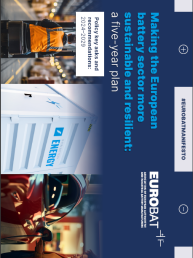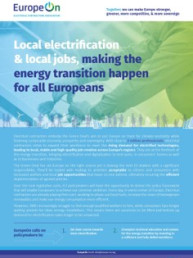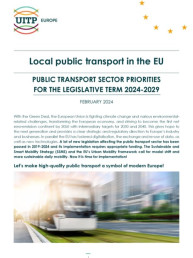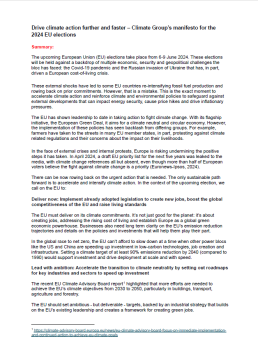Urgent Statement: Reversing the 2035 zero emission cars goal will harm EU industry
Urgent Statement
Reversing the 2035 zero emission cars goal will harm EU industry
12th June 2024,
Brussels
The Platform for Electromobility is very concerned by recent statements calling on the incoming European Commission to reverse the already agreed on CO2 Standards for cars and vans. Today, the 2035 zero emission cars goal is Europe’s most straight-forward EV industrial strategy bringing vital investment to European companies.
We strongly warn against undermining key EU legislation already agreed by MEPs and EU countries in the last legislative period.
Attracting investment to create the net-zero industrial ecosystem for zero-emission mobility is not possible without a consistent, clear regulatory framework.
To “hit reverse” now would also significantly penalise all industrial actors, including many of our members, who have already invested in this transition (automotive, batteries, infrastructure, etc.).
The cars and vans CO2 legislation, as agreed by the European Parliament and the Council of the European Union in 2023, is also in the interest of European consumers: it will increase the offer and promote the market uptake of zero-emission vehicles. With an increased market, zero-emissions vehicles will become more affordable with a continuously reduced total cost of ownership and there will be more choice for consumers. This will also help tackle air quality and noise issues, further benefitting European citizens.
The Platform for Electromobility, a 47-member strong alliance, urges the incoming European Commission President to safeguard the agreement settled between the Parliament and the Council ensuring all new cars and vans sold by 2035 will be zero-emission. Reneging on this deal not only puts at risk the EU’s goal to fully decarbonise road transport by 2050 but undermines Europe’s re-industrialisation efforts and global competitiveness.
Electromobility Stakeholders' Manifesto Compilation for 2024-2029
EU Elections
Compilation of Electromobility Stakeholders' Manifestos for 2024-2029
A unique document for policy-makers to tackle challenges ahead of us and make electric mobility transition a success for people, climate and businesses.
Europe’s future, decarbonised mobility ecosystem will be composed by a myriad of stakeholders. To make the energy transition a success, they all present both specific and cross-sectoral needs. All presented in this unique document.
Hereby, we present a unique compilation of the political manifestos from several members of the Platform for Electromobility. It stands as a testament to the collective effort and unified vision driving the advancement of electric mobility across all sustainable modes of transportation; but also showcases the diversity of legislative measures and political steps that remain to be taken for each and every sectors.
Within these manifestos lie the cornerstone recommendations crucial for the development and integration of electric mobility into European societies and economies. They stem from a diverse range of entities spanning industries, associations, NGOs, and local authorities, underscoring the breadth and depth of stakeholder involvement in shaping the decarbonised mobility ecosystem. As we approach the EU elections, this consolidated document serves as an exceptional resource for policymakers and stakeholders alike, providing them with a comprehensive overview of the priorities and aspirations of all the sectors composing the clean mobility system of tomorrow.
Transpiring from all manifestos presented here are cross-sectoral imperatives captured by the triple priority : Implement, Invest, Industrialise. Implement the Green Deal’s legislative measures. Invest to make the Green Deal a concrete reality. And industrialise to make the Green Deal beneficial for all Europeans, climate, people and businesses alike. These overarching goals gathered in the Platform for Electromobility’s manifesto, represent the pillars upon which our collective success rests. I invite you to delve into this compilation and explore the nuanced perspectives and unique contributions of each sector. Each of them is a milestone on the path towards a sustainable, electrified mobility.
Access each individual manifesto for 2024-2029 below.
Open Letter to Prof. Draghi and EU Heads of States on EU Competitiveness Strategy
Open letter
Platform Chair: Prioritizing EU Competitiveness in the Transport Sector
to Prof. Mario Draghi and EU Heads of States
Industrial competitiveness will be high on the agenda of the Special European Council of 17th and 18th April in Brussels. It has lately tended to overshadow sustainability. We, members of the Platform for Electromobility, a unique coalition of industries, NGOs, and civil society organizations committed to advancing electric mobility across all modes of transportation in Europe, firmly believe there can be no industrial competitiveness without sustainability. The Green Deal has set the course. It is imperative to implement it swiftly and continue in that direction.
The EU does need an industrial strategy to ensure its businesses can complete the transition as planned. In our latest publication, “A 360° e-mobility industry strategy“, you will find five recommendations we believe should be a priority of the next strategic agenda:
-
Ensuring regulatory stability for industries and investors. This means first and foremost ensuring that the European Green Deal legislations as voted in the 2019-2024 mandate remain steady over time.
-
Enhancing value chain competitiveness and resilience. European industrial policy initiatives should see their focus widened from specific components to a more comprehensive approach, spanning from raw materials to end products and from individual to all modes of sustainable transportation.
-
Financing the short-term transition through accessible opportunities. Existing EU funds can already serve as valuable assets if they are distributed efficiently and intelligently, notably by streamlining access to finance, particularly for net-zero industries, through instruments such as the Innovation Fund and InvestEU.
-
Establishing a Net Zero Investment Plan for long-term financing. The STEP platform, although welcomed, unfortunately far from the pan-European response to global competition on cleantech that the EU needs.
-
Strengthening international cooperation. Strengthening ties with diverse regions would diversify sources, reduce geopolitical risks and uncertainties, ensure a secure supply chain, enhance global industrial collaborations, and uphold a fair competitive environment for all clean transport industries.
We urge the European Council and the upcoming report of the future of European Competitiveness to recognise that industrial competitiveness and sustainability are intrinsically linked and cannot go one without the other. Hoping that our recommendations will help shape the policy priorities of the upcoming EU legislative cycle, we stand ready to contribute to the discussions further.
Céline Domecq
Chair of the Platform for Electromobility, 2024
Open letter
Accelerating the electrification of fleets is key to cut transport emissions and increase affordable electric vehicles for consumers
To European Commission Executive Vice-President for the European Green Deal,
To the European Commissioner for Climate Action,
To the European Commissioner for Transport,
Maroš Šefčovič
Adina-Ioana Vălean
Wopke Hoekstra
Dear,
First of all, we would like to congratulate Mr Šefčovič and Mr Hoekstra with their appointment respectively as Executive Vice-President for European Green Deal, Interinstitutional Relations and Foresight and Commissioner for Climate Action. We look forward to working together with you and supporting you during the upcoming mandate.
EU action to accelerate fleet electrification represents a golden opportunity to not only tackle transport emissions, EU’s largest source of greenhouse gas emissions, but also widen the access to cheaper second-hand electric vehicles. We therefore very much welcome Vice-President Šefčovič’s pledge during last week’s hearing that “By the end of the year, the Commission will launch a public consultation in preparation for future action to accelerate the electrification of corporate fleets by 2030.”
6 out of 10 cars sold in the EU are company cars, with those vehicles driving twice as much as private cars. The purchasing decisions of corporate fleets have far wider implications than just for that enterprise. Company cars tend to spend 3 to 5 years in a fleet before going into the used car market. With 8 out of 10 Europeans buying their cars in the used car market, this is a crucial channel for EU citizens.
Accelerating the transition towards electric vehicles beyond existing policies is a necessity to achieve transport’s net-zero and the 2040 climate target of -90%. As such, the faster fleets electrify their company cars, the faster more households will be able to access more affordable electric vehicles powered by clean European electricity, the faster we can reduce transport emissions. This is a win-win for climate and consumers.
Corporate fleets are in a great position to lead the way on electrification, with many already committed to fully transitioning their fleets by the end of the decade through Climate Group’s EV100 campaign. On a total cost of ownership basis, electric vehicles have the advantage over polluting vehicles meaning electrification makes strong business sense too. A regulatory framework would simply ensure that all fleets are playing their part.
That’s why the Platform for electromobility – the alliance of uniting automotive industries, NGOs, civil society and cities, the Europe’s leading consumer association and the leading global initiative bringing together fleets committed to electrification – are uniting and calling on you to:
- Deliver on your promise to launch a public consultation by the end of this year at the very latest.
- Limit the scope of the public consultation to legislative options to accelerate fleets electrification of at least 95% by 2030.
- Include light commercial vehicles in the scope of this public consultation.
- As part of this consultation come forward with a timeline for a swift adoption of this legislation.
We hereby reiterate that we fully support the European Commission in setting binding zero emission purchase targets for corporate fleet (passenger cars) of minimum 65% in 2027 and 95% in 2030 and binding electrification targets for light commercial vehicles.
We would very much appreciate a meeting where we can discuss this initiative. We count on your leadership to bring forward a public consultation.
With kind regards,

13th October 2023
Greening Corporate Fleets Initiative: support to the launch of a public consultation
The Platform for electromobility supports the launch of a public consultation on the Greening Corporate Fleets Initiative .
The members of the Platform for electromobility, a leading advocate for sustainable mobility and environmental development, hereby publicly expresses their strong support for the Greening Corporate Fleets Initiative included in the European Commission’s work program for 2023 and called for by the European Parliament in May 2022.
We understand that it will be difficult to launch and complete this initiative before the end of the Commission’s mandate in 2024. We would however very positively welcome the launch of a public consultation on this very important topic to collect as much data and information to guarantee the success of such an initiative at a later date.
The Greening Corporate Fleets Initiative represents a vital step toward accelerating the transition to electric mobility, ensuring a sustainable future for both our environment and society. By calling for a comprehensive framework for corporate fleet emissions reduction, this initiative aligns with our previous policy recommendations on the matter (the reasons, the concerns and the methods). We firmly believe that it presents an excellent opportunity to drive meaningful change while safeguarding the interests of the most modest individuals who should not bear the sole burden of the transition.
The environmental benefits of the Greening Corporate Fleets Initiative cannot be overstated. By incentivizing and supporting the adoption of electric vehicles across corporate fleets which are now electrifying slower than private vehicles[1], we can significantly reduce greenhouse gas emissions and limit the impacts of transportation on our climate. This aligns with the ambitious climate targets set forth in the European Green Deal.
Furthermore, the social aspect of this initiative should not be overlooked. By focusing on corporate fleets, the Greening Corporate Fleets Initiative ensures a fair distribution of the costs associated with the transition to greener mobility solutions. As stated above, by shouldering a portion of the burden, corporations can contribute to building a more sustainable future while least-well-off families are not unduly burdened by the costs of this transition.
Moreover, the initiative’s emphasis on creating a robust second-hand market for electric vehicles is commendable. A thriving secondary market for EVs will not only enhance the affordability of these vehicles but also encourage the wider adoption of clean transport solutions. By stimulating the circular economy, this initiative will unlock significant economic and environmental benefits.
In conclusion, the Platform supports the Greening Corporate Fleets Initiative and encourages DG MOVE to promptly initiate a public consultation on this crucial matter. We believe that by working collaboratively, policymakers, industry stakeholders, and citizens can co-create a sustainable mobility landscape that fosters environmental stewardship, social equity, and economic growth.
[1] https://www.transportenvironment.org/wp-content/uploads/2023/05/Briefing-on-Fleets-Regulation-3.pdf
Weights & Dimensions Directive: ACEA, Platform for electromobility and Hydrogen Europe call it a priority in a joint letter
Open letter
Calling co-legislators for swift progress on the revision of the Weight and Dimensions Directive
To European Commission Executive Vice-President for the European Green Deal, Frans Timmermans
To the European Commissioner for Transport, Adina-Ioana Vălean
To Ambassador and Permanent Representative of Spain to the European Union, D. Marcos Alonso Alonso
To the Presidents of the TRAN and ENVI Committees of the European Parliament, Karima Delli and Pascal Canfin
To the Presidents of the European Parliament Political Groups,
Dear,
We, the undersigned representatives from the European Automobile Manufacturers’ Association (ACEA), the Platform for electromobility and Hydrogen Europe, representing the majority of industry stakeholders and civil society in vehicle manufacturing, direct electrification and hydrogen value chain, are writing to highlight the crucial role of establishing a full set of enabling conditions to support the transition of the European road transport industry to climate neutrality by 2050. The Review of the Weights & Dimensions (W&D) Directive is one crucial element of the regulatory framework to facilitate the market uptake of zero-emission, battery-electric and hydrogen-powered trucks and buses. We are concerned that any further delays and persistent uncertainty surrounding a timely adoption and implementation of a revised Weights and Dimensions Directive would be detrimental to our joint climate neutrality ambition and the EU target of 90% transport emission reduction by 2050.
Zero-emission vehicles (ZEVs) will have to become the backbone of road transport if the sector is to reach its decarbonisation targets. Zero-emission vehicles (ZEVs) come with additional requirements with respect to available space in the vehicles, total vehicle weight and axle weights. These ddifferences to vehicles powered by fossil fuels should be addressed in the review with an aim to remove any barriers that can hinder their market uptake and firmly place them on a level playing field with vehicles powered by fossil fuels.
The Review should specifically:
- Simplify the Directive as much as possible and ensure a fully harmonized implementation in Member States
- Provide additional weight allowances for zero-emission vehicles and adjust the provisions for axle weights and vehicle length to accommodate the requirements of zero-emission powertrains.
- Ensure intermodal compatibility in the revision of the Weights & Dimensions Directive.
The Weights & Dimensions Directive must be seen as a key enabler of the transition to climate neutrality and should as such also be acknowledged by the co-legislators.
ACEA, the Platform for electromobility, and Hydrogen Europe are united in calling on the European institutions, namely the European Commission, the incoming Spanish Council Presidency, the European Parliament and EU Member States to prioritize making the necessary adjustments in the Weights & Dimensions framework. It is imperative that progress is made swiftly to remove barriers in the Weights & Dimensions framework that may hinder the market adoption of zero-emission trucks and buses.
We trust that you share our sense of urgency and will take the necessary steps to ensure that Europe establishes a coherent and supportive regulatory framework to enable the swift decarbonisation of road transport and seizes the opportunities provided by sustainable mobility.
Sincerely,
Open letter to German Chancellor Scholz on CO2 Standards for cars and vans
Open letter
Industry and civil society call for certainty, ambition, and respect of co-legislators’ agreement on CO2 standards for cars and vans
Adressed to German Chancellor Olaf Scholz
Dear Chancellor Olaf Scholz,
The recent yet indefinite postponement of the vote on the CO2 Standards for cars and vans within the Council of the European Union has brought concerns to both business and civil society organisations alike.
With this open letter, the Platform for electromobility, uniting both spheres in a 47-member strong alliance to ensure the conditions for the full electrification of new light-duty vehicles by 2035, renews its support to the overall greenhouse gas emissions reduction target of 55% by 2030 and the climate neutrality objective by 2050. Reducing – and ultimately eliminating – emissions from cars, vans and trucks will be key to achieving these objectives.
As validated by the European Parliament in February, the cars and vans CO2 legislation will increase the offer and promote the market uptake of zero-emission vehicles. With an increased market, zero-emissions vehicles will also become more affordable with a continuously reduced total cost of ownership and more choice for consumers and will also help tackle air quality and noise issues, bringing an overall benefit to society.
The EU CO2 standards regulation delivers genuine benefits for transport, ensuring planning and investment certainty, setting clear signals to not only car makers and consumers but also to EV infrastructure providers on the required pace for the transition to zero-emission mobility. However, recent political backpedalling has severely blurred those signals to European industries, investors and infrastructure providers as well as the legal certainty formerly established by the EU’s institutional procedures.
The Platform for electromobility thus urges the Swedish Government, as President of the Council, to first provide clarity and certainty on the agenda and secondly to safeguard the agreement as was already agreed in good faith between the EP and Council. Reneging on this deal not only puts at risk the EU Green Deal’s goal to fully decarbonise road transport by 2050, but undermines the very credibility of the EU’s established democratic norms.
Sincerely yours,
CO2 Standards for HDVs: Our open letter to Commissioner Breton to boost clean tech industries
Open letter
Cleantech companies and civil society see ambitious truck CO2 standards as catalyst for growing EU supply chains
Adressed to Commissioner Thierry Breton
Dear Commissioner Breton,
We, a large group of industries and civil society organisations stakeholders from the freight, e-mobility and clean tech supply chain, welcome your efforts to respond to the U.S. IRA and boost investments into sustainable and clean European technologies. As we are actively working on the decarbonisation of our industry branches, we fully support the targets of the European Green Deal and Europe’s 2030 and 2050 climate targets.
The Smart & Sustainable Mobility Strategy sets a clear goal for Europe to reduce transport emissions by 90% in 2050. Decarbonising freight transport will require reducing its dependency on fossil fuels, shifting a larger share of traffic to more sustainable transport modes and finally through the internalisation of external costs. The upcoming CO2 performance standards for heavy-duty vehicles (HDV) will stimulate the investments required to achieve the first of these objectives. Cleantech in the EU road freight and heavy-duty vehicle infrastructure sectors is in the early stages. By mirroring the new targets for trucks to the blueprint Europe has just set out for its automotive sector, these sectors can surf on and amplify each other’s supply chains. Mandating around half of new trucks to be zero emission from 2030 and almost all of them from 2035 will shore up demand for battery cells made in EU gigafactories and staffed with EU workers. A balanced policy mix matches increased governmental investment support with such greater demands from, and clarity on the shared end goals for, our EU industries. This will help greening homegrown EU freight sector that can compete with, and ultimately again overcome, competition from across the oceans.
Today, zero-emission trucks are still produced in small numbers. Ambitious standards for trucks can achieve what has been done for cars: seriously scaling up the supply, thereby bringing down the cost per unit. Whilst the CO2 standards as a regulatory tool safeguard the roadmap for a rapid green transition, the subsidies funnel money directly into the sustainable freight and mobility solutions to enable and ensure a thriving European clean tech industry. That way all actors, especially smaller and medium-sized companies, remain competitive and can be part of Europe’s green transition.
We, the undersigned organisations, see ambitious CO2 targets for trucks as an essential means to ensure EU cleantech investments are boosted and channelled into sustainable road freight technologies. This complements the parallel push to switch traffic to more sustainable modes of transport and the internalisation of external costs. Green technologies – from renewable energy to battery production – will secure and provide jobs in Europe, now and in the future. Strong CO2 standards provide certainty to our European industries in a challenging and changing world. And they utilise the momentum of progressive frontrunners that have shown electric trucks are part of Europe’s flagship clean technologies.


























